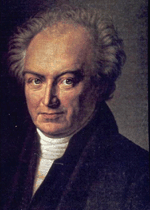Olbers, Heinrich Wilhelm Matthéus (1758–1840)
Heinrich Olbers was a German physician and skilled amateur astronomer who discovered the asteroids Pallas (1802) and Vesta (1807), rediscovered Ceres based on a position predicted by Carl Gauss, and found five comets (in 1798, 1802, 1804, 1815, and 1821) one of which (that of 1815) bears his name. He also formulated a method of calculating the orbits of comets (1779), which became standard in the 19th century; rediscovered the planet Uranus (1781); proposed that the pressure of light is responsible for comet's tails always pointing away from the Sun (1811); and first drew attention to what became known as Olbers' paradox (1823).
 |
Olbers was a supporter of pluralism and of the increasingly contentious idea that the Moon was inhabited by intelligent beings. In the same paper in which he presented his famous paradox, he wrote that it is "most highly probable" that "all of infinite space is filled with suns and their retinues of planets and comets."
Olbers was born at Arbergen, a village of Bremen, studied medicine at Göttingen from 1777 to 1780, at subsequently practiced at Bremen. In 1811 he was a successful competitor for the prize proposed by Napoleon for the best "Memoir on the Croup."


